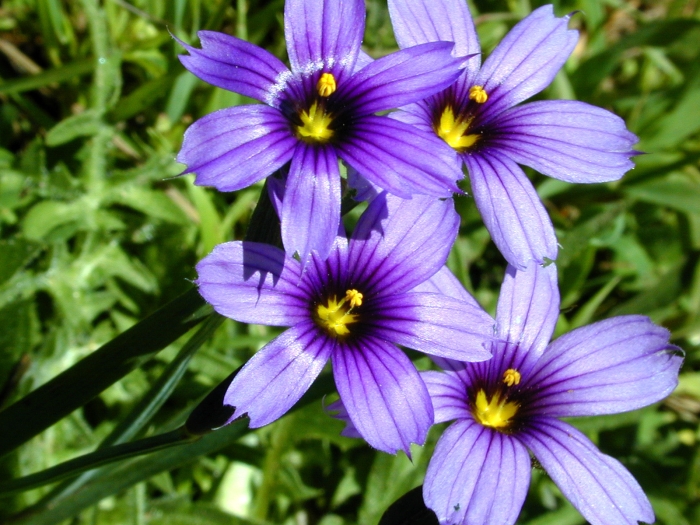Western Blue-Eyed Grass
(Sisyrinchium bellum)
Western Blue-Eyed Grass (Sisyrinchium bellum)
/
/

Dawn Endico from Menlo Park, California
CC BY-SA 2.0
Image By:
Dawn Endico from Menlo Park, California
Recorded By:
Copyright:
CC BY-SA 2.0
Copyright Notice:
Photo by: Dawn Endico from Menlo Park, California | License Type: CC BY-SA 2.0 | License URL: https://creativecommons.org/licenses/by-sa/2.0 | Uploader: File Upload Bot (Magnus Manske) | Publisher: Wikimedia Commons | Title: Blue_Eyed_Grass,_Bay_Area.jpg | Notes: User created page with UploadWizard |




















































Estimated Native Range
Summary
Sisyrinchium bellum, commonly known as Western Blue-Eyed Grass, is a semi-deciduous perennial herb that is actually more closely related to the iris family than true grasses. It is native to open woodlands, grasslands, and chaparral regions of Baja California, California, and Oregon. This plant typically grows to about 60 centimeters (24 inches) in height, with grass-like, tufted leaves that form a clump. The star-shaped flowers are purplish-blue, with variations ranging from true blue to a more distinct purple, and occasionally, white-flowering individuals can be found. The blooming period extends from March to July, peaking in April, and the plant is known for its showy flowers that attract pollinators such as bees and butterflies.
Western Blue-Eyed Grass is valued for its vibrant flowers and ease of maintenance, making it a popular choice for rock gardens, borders, and native plant gardens. It is also used for its ornamental grass-like foliage, which adds texture to garden compositions. While it prefers moist conditions and well-drained soils, it is drought-tolerant once established and can survive summer dryness. It is moderately hardy, tolerating temperatures down to 20°F (−7°C). For best results, plant in an area with full sun to part shade and provide medium to high amounts of water with well-draining soil. It can be propagated by seeds, which self-sow, or by division of rhizomes. Flower stems can also be rooted. Potential problems include root rot in overly wet conditions and susceptibility to rust and leaf spot diseases.CC BY-SA 4.0
Western Blue-Eyed Grass is valued for its vibrant flowers and ease of maintenance, making it a popular choice for rock gardens, borders, and native plant gardens. It is also used for its ornamental grass-like foliage, which adds texture to garden compositions. While it prefers moist conditions and well-drained soils, it is drought-tolerant once established and can survive summer dryness. It is moderately hardy, tolerating temperatures down to 20°F (−7°C). For best results, plant in an area with full sun to part shade and provide medium to high amounts of water with well-draining soil. It can be propagated by seeds, which self-sow, or by division of rhizomes. Flower stems can also be rooted. Potential problems include root rot in overly wet conditions and susceptibility to rust and leaf spot diseases.CC BY-SA 4.0
Plant Description
- Plant Type: Herb
- Height: 0.5-0.8 feet
- Width: 2-3 feet
- Growth Rate: Moderate
- Flower Color: Blue, White
- Flowering Season: Spring
- Leaf Retention: Semi-deciduous
Growth Requirements
- Sun: Full Sun, Part Shade
- Water: Medium
- Drainage: Fast, Medium
Common Uses
Bee Garden, Bird Garden, Border Plant, Butterfly Garden, Deer Resistant, Drought Tolerant, Erosion Control, Groundcover, Low Maintenance, Potted Plant, Rabbit Resistant, Salt Tolerant, Showy Flowers, Street Planting
Natural Habitat
Native to open woodlands, grasslands, and chaparral regions
Other Names
Common Names: Californian Blue-Eyed Grass
Scientific Names: Sisyrinchium bellum , Sisyrinchium eastwoodiae , Sisyrinchium greenei , Sisyrinchium maritimum , Sisyrinchium hesperium , Bermudiana bella , Sisyrinchium angustifolium var. bellum
GBIF Accepted Name: Sisyrinchium bellum S.Watson